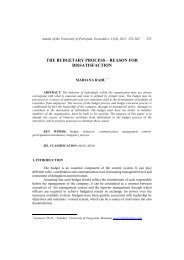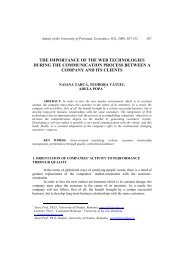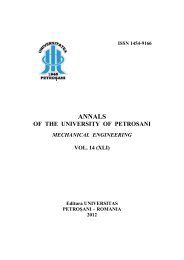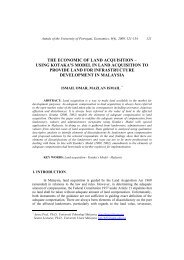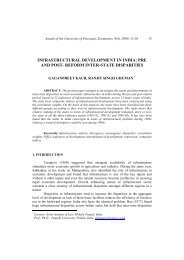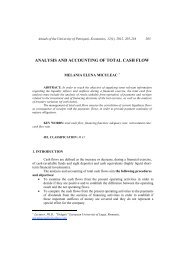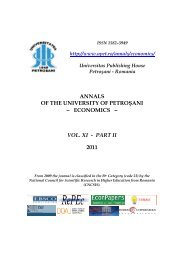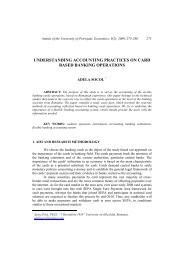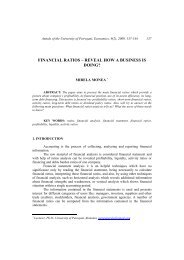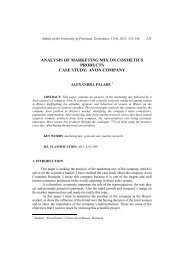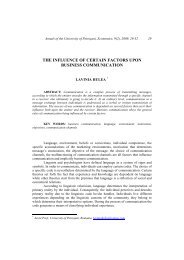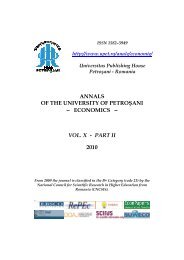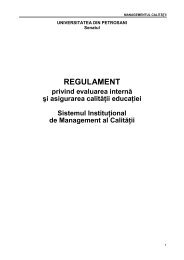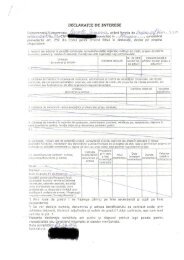annals of the university of petroÅani â¼ economics â¼ vol. xi - part i ...
annals of the university of petroÅani â¼ economics â¼ vol. xi - part i ...
annals of the university of petroÅani â¼ economics â¼ vol. xi - part i ...
You also want an ePaper? Increase the reach of your titles
YUMPU automatically turns print PDFs into web optimized ePapers that Google loves.
54 Cenar, I.<br />
The accounting research helps conduct rational investigations with <strong>the</strong> aim <strong>of</strong><br />
improving communication between users <strong>of</strong> accounting information and society so that<br />
<strong>the</strong> accounting practice will progress continuously.<br />
3. THE PRINCIPLES OF SCIENTIFIC RESEARCH IN ACCOUNTING<br />
The principles <strong>of</strong> scientific research are absolutely necessary guiding marks to<br />
which a serious and honest researcher should continuously relate his ideas and activity<br />
in order to maintain and follow “<strong>the</strong> right path”, namely <strong>the</strong> method, in finding and<br />
discovering <strong>the</strong> truth applied to <strong>the</strong> object <strong>of</strong> his research (Enachescu, 2007).<br />
They are also “moral guiding marks” that force and impose a certain ethical<br />
attitude to <strong>the</strong> researcher towards his study object, and especially towards <strong>the</strong> results<br />
obtained after <strong>the</strong> methodical analysis <strong>of</strong> <strong>the</strong> investigated subject.<br />
The principle represents <strong>the</strong> assertion that underlines a deduction. The principle<br />
provides explanations for a large number <strong>of</strong> cases, being checked thoroughly. The<br />
principle derives its validity from previous empirical tests, unlike <strong>the</strong> hypo<strong>the</strong>sis,<br />
which “derives its validity not from what precedes it, but from what follows it”.<br />
Achieving <strong>the</strong> fundamental objective <strong>of</strong> accounting, <strong>the</strong> accurate picture,<br />
requires turning to accounting postulates, principles and rules. When referring to<br />
research in accounting, <strong>the</strong> syn<strong>the</strong>sis <strong>of</strong> <strong>the</strong> principles to be observed by researchers is:<br />
- Setting <strong>the</strong> objective. According to this principle, <strong>the</strong> accounting research’s subject<br />
has a certain objective that represents <strong>the</strong> aimed goal <strong>of</strong> that research.<br />
- Truth. The scientific research in accounting should aim to discover <strong>the</strong> truth about<br />
<strong>the</strong> studied object, to be coherent, logical and continuous and to be consistent with<br />
<strong>the</strong> reality <strong>of</strong> <strong>the</strong> researched object. At <strong>the</strong> same time, <strong>the</strong> results <strong>of</strong> <strong>the</strong> scientific<br />
research should be expressed by using an articulate, precise and intelligible<br />
language, avoiding subjectivity or speculation in thinking.<br />
- Methodology. The research should be conducted on <strong>the</strong> basis <strong>of</strong> a rigorously<br />
established plan. It is necessary to keep in line with <strong>the</strong> stages and working<br />
methods, and <strong>the</strong> working techniques and methods should be appropriate to <strong>the</strong><br />
nature <strong>of</strong> <strong>the</strong> studied subject, as well as to <strong>the</strong> objectives <strong>of</strong> <strong>the</strong> research.<br />
- Demonstration. The research’s results should be demonstrated and verified. They<br />
should also be included in <strong>the</strong> data system <strong>of</strong> <strong>the</strong> scientific area where <strong>the</strong><br />
accounting research is integrated.<br />
- Correlation. The results <strong>of</strong> <strong>the</strong> scientific research in accounting should be<br />
correlated with <strong>the</strong> available data in <strong>the</strong> field or <strong>the</strong> data in related scientific fields.<br />
- Assessment <strong>of</strong> <strong>the</strong> results. All <strong>the</strong> results <strong>of</strong> <strong>the</strong> research should be accurately<br />
assessed in a strictly rational approach, and compared with <strong>the</strong> data available in<br />
literature.<br />
- Utility. O<strong>the</strong>r specialists should routinely use <strong>the</strong> research’s results in <strong>the</strong>ory and<br />
practice.<br />
- Psycho-morality. Scientific research in accounting should be conducted according<br />
to deontological principles <strong>of</strong> an elite pr<strong>of</strong>ession; collaboration with experts in <strong>the</strong><br />
field or in related fields in order to avoid overlapping or errors that may occur<br />
when obtaining and interpreting <strong>the</strong> results; it should be opened and sincere.



